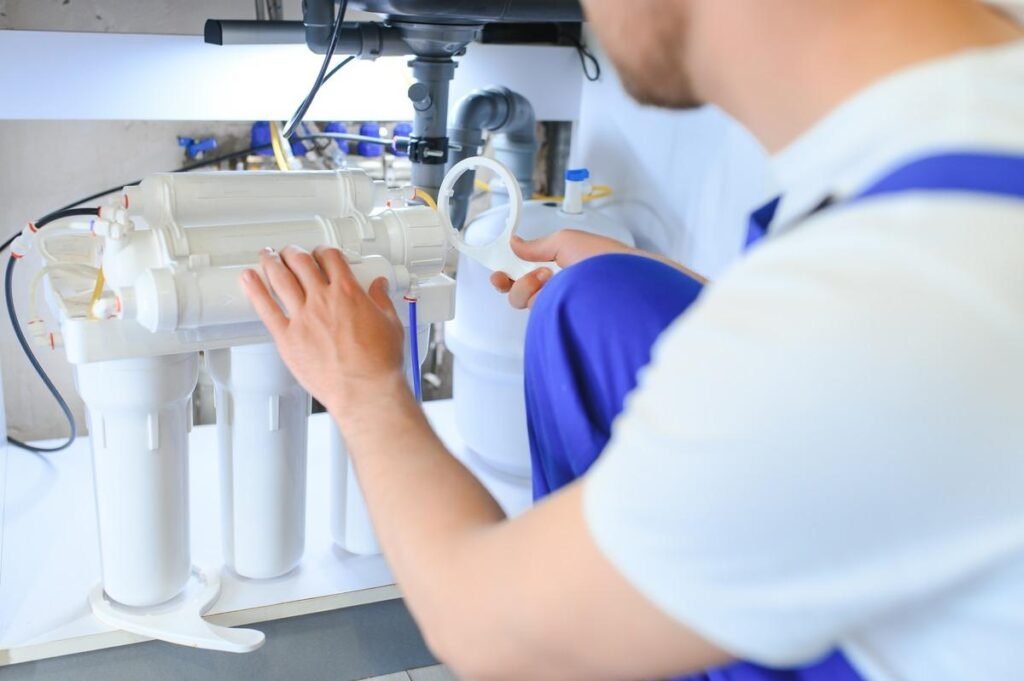A reverse osmosis water filtration system ensures clean, safe drinking water at home. Nevertheless, with time, these systems might experience wear and tear that impairs their functionality. There are some clear indicators that it might be time to upgrade, even though routine maintenance can help them last longer. If you disregard these warning indicators, your home may become susceptible to inadequate water filtration or low-quality water. Being aware of these early warning indicators will help you make sure your filtration system keeps up with your needs even in the face of deteriorating water quality or frequent repairs.
Declining Water Quality: Why It’s Time to Upgrade
Upgrading your reverse osmosis water filtration system often follows a noticeable decline in water quality. Strange flavors in your drinking water are a red flag. If it appears cloudy or has an unpleasant odor, your system may no longer be working efficiently. These changes are clear signs that something’s wrong with your filtration system.
Filters may have reached their limit, causing them to lose effectiveness. In some cases, harmful contaminants might slip through, affecting the overall safety of your drinking water. Even with regular filter changes, older systems struggle to maintain the same level of performance. Upgrading ensures that your water remains pure and free from unwanted substances.
Slower Water Flow: A Common Indicator of System Wear
Every reverse osmosis water filtration system has filters with a set lifespan. The system’s capacity to remove impurities decreases as these filters get older. If you’ve noticed that your water quality has dropped, even after changing filters, it could mean the system itself is wearing out. When a filter’s allotted quantity of gallons or months is reached, it can no longer function as intended.
Regular filter replacements are necessary, but after a certain point, an upgrade may be more effective. Ignoring an expired filter could lead to harmful contaminants passing through. If you find yourself replacing filters more often than recommended or experiencing frequent issues, it’s a sign that the system is no longer reliable.
Filter Lifespan Exceeded: How to Know When to Replace
If your reverse osmosis water filtration system requires frequent repairs, it may be time for an upgrade. Constant issues can indicate that the system is aging and losing efficiency. Regular maintenance is essential, but excessive repairs can become costly and frustrating. If you find yourself calling a technician often, consider whether these fixes are providing lasting solutions.
A system that needs continual attention may not be worth the investment. Upgrading to a newer model can save you time and money in the long run. Modern systems have improved designs and features. This can reduce the likelihood of breakdowns. Investing in a reliable unit ensures better performance and peace of mind.
Frequent System Repairs: When Maintenance Becomes Overwhelming
Older reverse osmosis water filtration systems may lack the advancements found in newer models. The state of technology has changed dramatically. This leads to better filtration processes and improved efficiency. If your system is several years old, you might miss out on features that enhance performance and convenience.
Modern systems often include better monitoring options, quicker filtration times, and lower water waste. They may also have improved design elements that make maintenance easier. Upgrading to a newer model can provide you with enhanced purification capabilities, ensuring cleaner water for your family.
Outdated Technology: Modern Features to Consider
Unusual tastes or odors are frequently signs that filters are not working properly. Even if filters have recently been changed, this problem might still occur. Within the system, contaminants may build up. The quality of the water you drink may be affected by this. Hazardous materials could stay in your water supply when filtration is difficult.
Ignoring these changes can pose health risks to you and your family. Addressing water quality issues quickly is essential. Upgrading to a more efficient system can ensure that your water remains clean and safe. Newer models are designed to handle various contaminants effectively.
Water Taste and Odor Changes: A Sign of Failing Filters
If you notice that your reverse osmosis water filtration system is using more water than before, it may be time to consider an upgrade. Older systems often waste water due to inefficient designs or worn-out components. A typical reverse osmosis system should have a good balance between filtered water and wastewater. When this balance is disrupted, it results in higher water usage.
Excessive waste not only affects your water bill but also indicates that the system may not be functioning properly. An upgrade can provide better efficiency, allowing you to get more filtered water with less waste. Newer models are often designed with improved technology that minimizes water usage.
Increased Water Usage: Inefficient Systems Waste More Water
You should be aware of any unusual noise coming from your reverse osmosis water filtration system. Silent operation and clean water delivery without interfering with daily life are hallmarks of a well-performing system. Unusual noises, like grinding or hissing, might be signs of internal problems that require repair.
These noises can result from worn-out components or air trapped in the system. Ignoring these signs may lead to more significant problems down the line. If repairs don’t resolve the noise, consider the benefits of upgrading to a newer model. Modern systems often operate more quietly and efficiently. An upgrade not only reduces noise but also enhances overall performance.
Noisy Operation: When Your System Gets Too Loud
New appliances and gadgets often require modern filtration solutions that older systems cannot provide. If you’ve upgraded your kitchen appliances or home systems, ensure your water filtration is compatible. Some newer technologies integrate features that enhance filtration efficiency and convenience. If your current system lacks these advancements, it may be time to consider an upgrade.
Modern systems often come with smart features that allow remote monitoring and control. This added functionality can improve your overall water quality experience. Staying updated with the latest technology ensures that you enjoy the benefits of cleaner water and improved usability.
Key Takeaway
Upgrading your reverse osmosis water filtration system is essential when you notice specific signs. Declining water quality, slower water flow, and the need for frequent repairs indicate that it may no longer function effectively. If the filter lifespan is exceeded or you experience changes in taste and odor, these are clear warnings.
Increased water usage and noisy operation also suggest that your system might be failing. Lastly, compatibility with new technology is crucial in maintaining efficiency. Addressing these signs promptly ensures your home has access to clean and safe drinking water.
Evaluating your system regularly helps decide when it’s time for an upgrade. This way can lead to better performance and improved water quality. Prioritizing these factors can enhance your overall water filtration experience.




